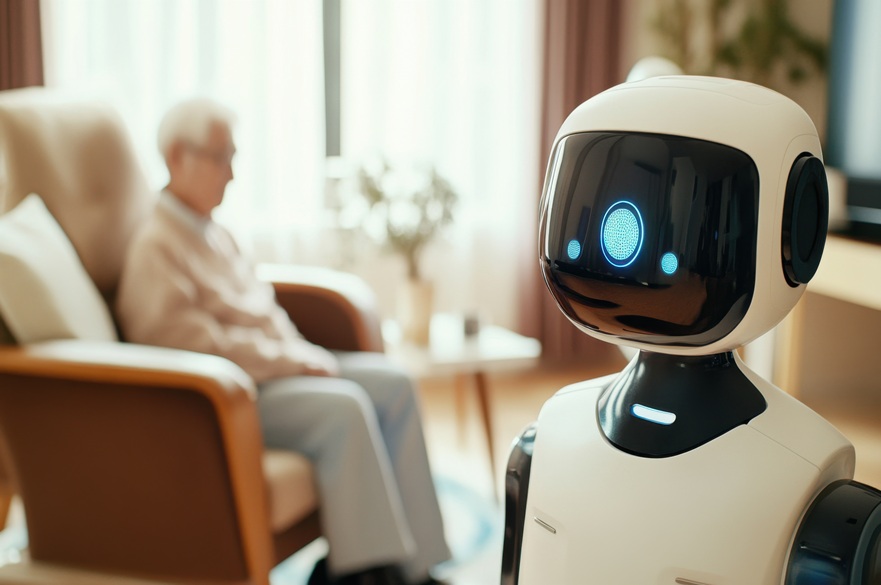New report calls for robust regulation of home care robots
As the UK grapples with workforce shortages and an ageing population, interest is growing in the use of robots to support care at home.
By Dave Rogers | Published on 3 July 2025
Categories: Press office; Research; School of Science and Technology;

But a new report from the Institution of Mechanical Engineers – co-authored by Nottingham Trent University researcher Professor Daniele Magistro – sounds a note of caution, spotlighting ethical, regulatory, and practical challenges surrounding the deployment of socially assistive robots (SARs) in home-based settings.
In its report “Automating the Home”, the Institution calls for the robust regulation of home care robots to ensure these technologies are safe, reliable and protect users' rights and privacy.
The NHS has embraced the potential of robots and autonomous systems as part of a wider digital transformation strategy, including its vision for a “neighbourhood health service,” focusing on community-based care.
Fragmented national approach
Despite the NHS’ vision, the national approach to home care robots remains fragmented. The report highlights delays in adult social care reform and continued silence from policymakers on timelines and governance frameworks as hindering the up take in robots for domestic settings.
Professor Helen Meese, the report’s author and former Chair of the Institution’s Biomedical Engineering Division, said:
“As these technologies become increasingly integrated into household routines, they offer significant benefits, such as increased efficiency in performing everyday tasks and greater companionship. However, the demand for SARs in domestic and healthcare settings also raises critical concerns related to safety, privacy, cybersecurity and ethics.
Robots may be ready for our homes — but our policy, ethics, and infrastructure are not.”
This report explores what international standards and regional regulations are presently available for governing the use of robots and autonomous systems in established environments such as manufacturing. It looks at how these regulations might be integrated or adapted for use in healthcare and specifically SARs in the home.
In examining these standards, this report highlights the necessity of balancing innovation with protecting users.
Recommendations
The report’s recommendations include:
Establishing comprehensive safety standards for healthcare and service robots to
address risks specific to the home environment, including interactions with children and pets.
Promote ethics and transparent use with guidelines on user consent, transparency in data usage, and measures to prevent over-reliance on robotic assistance.
Focus on patient-centred care by prioritising patient safety and comfort in the design and deployment of SARs, ensuring they enhance rather than hinder patient
care.
Enhance cybersecurity and data protection by implementing stringent privacy and security regulation measures for healthcare robots, addressing data encryption, user consent and transparent data handling practices.
The report concludes with a clear call to action for policymakers:
“If the UK is to realise the full benefits of socially assistive robots, it must act now to create the ethical, legal, and infrastructural foundations required for safe and inclusive deployment in our homes.”
Professor Magistro, Associate Professor in Physical Activity and Health in Nottingham Trent University’s School of Science and Technology, said: “Socially assistive robots offer real potential to support older adults at home, but without clear, ethical, and user-centred regulation, we risk creating technology that does more harm than good.
“These systems must be not only intelligent, but also safe, inclusive, and genuinely responsive to the needs of the people they are meant to help.”
The report’s contributors also included Prof Alessandro Di Nuovo from Sheffield Hallam University, Dr Lucie Nield from University of Sheffield and Prof Massimiliano Zecca from Loughborough University.
Notes for Editors
Press enquiries please contact Dave Rogers, Public Relations Manager, on telephone +44 (0)115 848 8782, or via email.
Nottingham Trent University (NTU) has been named UK ‘University of the Year’ five times in six years, (Times Higher Education Awards 2017, The Guardian University Awards 2019, The Times and Sunday Times 2018 and 2023, Whatuni Student Choice Awards 2023) and is consistently one of the top performing modern universities in the UK.
It is the 3rd best modern university in the UK (The Times and Sunday Times Good University Guide 2023). Students have voted NTU 1st in the UK for student employability (Uni Compare 2025)
NTU is the 5th largest UK institution by student numbers, with over 40,000 students and more than 4,400 staff located across six campuses. It has an international student population of almost 7,000 and an NTU community representing over 160 countries.
NTU owns two Queen’s Anniversary Prizes for outstanding achievements in research (2015, 2021). The first recognises NTU’s research on the safety and security of global citizens. The second was awarded for research in science, engineering, arts and humanities to investigate and restore cultural objects, buildings and heritage. The Research Excellence Framework (2021) classed 83% of NTU’s research activity as either world-leading or internationally excellent.
NTU was awarded GOLD in the national 2023 Teaching Excellence Framework (TEF) assessment, as it was in 2019.
NTU is a top 10 for sport (British Universities and Colleges Sport league table 2023).
NTU is the most environmentally sustainable university in the UK and second in the world (UI Green Metric University World Rankings, 2023).